6, August 2019
Southern Cameroonian journalists fear for their lives 0
Cameroonian journalists who choose to remain in the Anglophone regions increasingly prefer to report on non-controversial issues such as health, education and infrastructure and avoid discussing the ongoing conflict.
Separatists and government troops alike will not hesitate to harass authors of reports that are not in their interest. Raymond Ndingana is one of many journalists who have been harassed by government troops.
“The last time I fell into the hands of the military, they almost destroyed my working tools simply because they asked me a question in French and I responded in English,” Ndigana told DW. “They got angry and called me all sorts of names.”
Caught between the fronts
Constant armed confrontations between the regular army and separatist fighters prevent journalists from going out into the field to cover events and file reports. But that is not the only difficulty the reporters face. Fon Quinta, a journalist for Vision 4 television, has been covering the Anglophone crisis for over two years. Quinta says that her duty as a journalist is to report on events in a fair and balanced way. But this is becomig impossible. “The government will call and say: ‘You’re working hand in glove with the separatists’,” she said. The separatists have also called her, accusing her of standing in the way of independence.
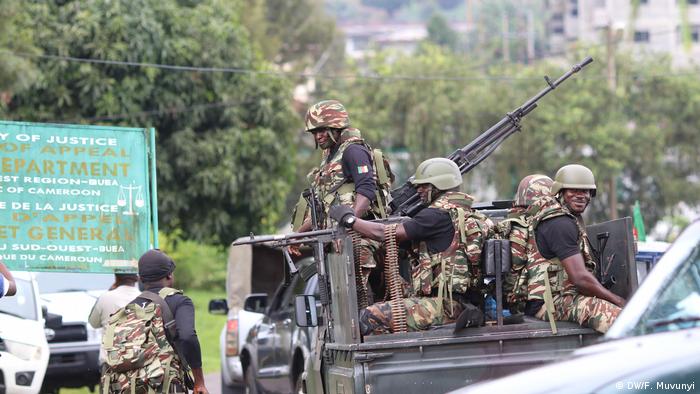
Anglophone journalists fear government troops and separatists
Fongoh Primus from Rainbow Radio Mbengwi agrees that journalists are faced with an impossible task. “How can I feel safe, when every day I see trigger-happy government soldiers armed to the teeth, pointing their guns at civilians and ready to kill, sometimes just for fun?” he told DW. “How can I feel safe when every day I come across drugged separatist fighters with fetish objects on their bodies carrying sophisticated weapons and ready to shoot to death any suspects?”
Self-censorship is the new normal
According to Maikem Emmanuella, radio station manager at NVEFCAM, self-censorship is now common in many newsrooms. “You do not know what to say or write,” she said. Emmanuella does her job every day in a state of fear. “When writing a story, you have to be careful, especially when it concerns the crisis,” she explained. “We get stories of people shot by the military, but you can’t report on these cases and stories saying it was the military.” With many journalists now scared of reporting, there are fears that the most critical stories in Anglophone regions will go unreported.
English-speaking communities chafe at what they see as discrimination from the French-speaking majority. The government rejects demands for autonomy and has dispatched thousands of troops in a crackdown. There are currently no open channels for a dialogue between the government and the rebels. According to Human Rights Watch (HRW). Cameroonian authorities have regularly tortured and held incommunicado detainees arrested in the government’s crackdown on the armed separatist movement.
In October 2017, radical separatists declared the creation of the “Republic of Ambazonia,” covering the two English-speaking regions incorporated into Francophone Cameroon in 1961. The declaration went largely unnoticed outside Cameroon, and “Ambazonia” — named after a bay at the mouth of the Douala River — has not been officially recognized by the international community.
Source: DeutscheWelle




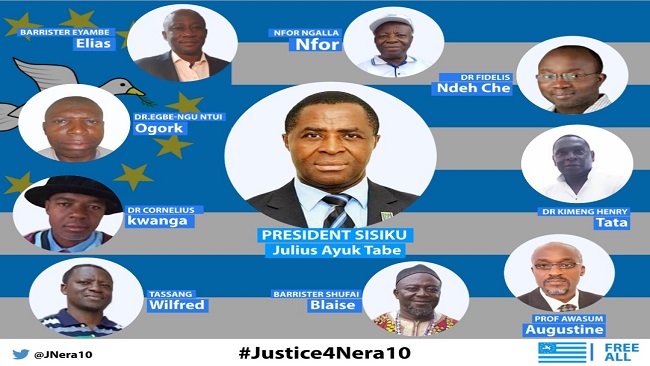




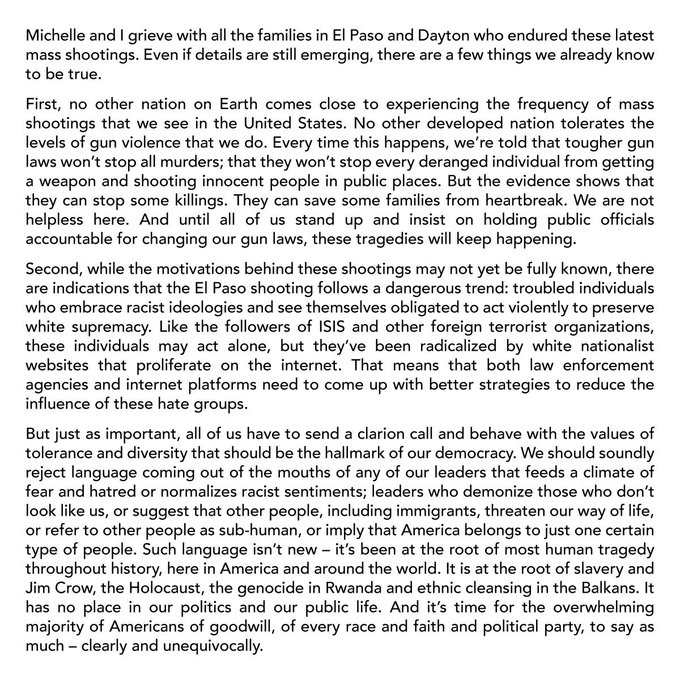


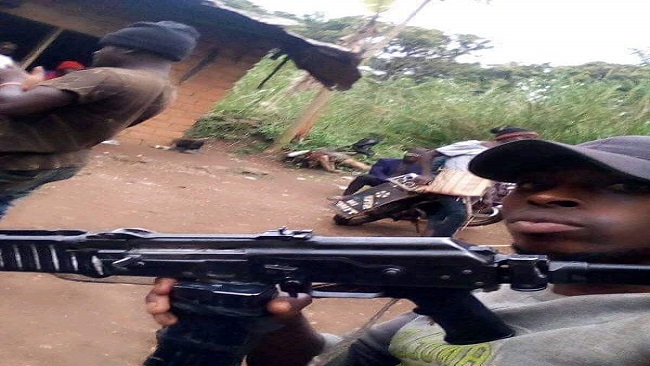
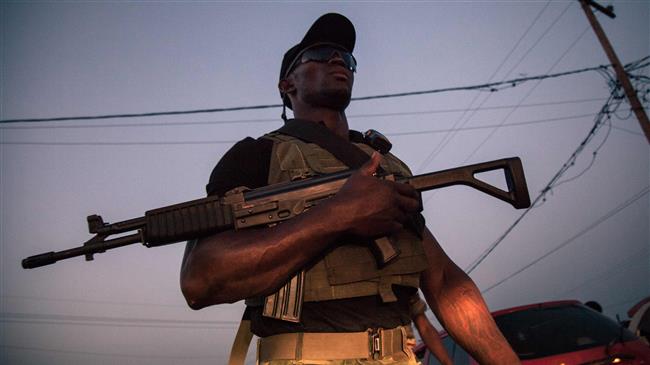



















6, August 2019
Malaria has killed 1,800 people in Burundi so far in 2019 0
Malaria has killed more than 1,800 people in Burundi this year, the United Nations (UN)’s humanitarian agency says, a death toll rivaling a deadly Ebola outbreak in the neighboring Democratic Republic of the Congo.
In its latest situation report, the United Nations Office for the Coordination of Humanitarian Affairs (OCHA) said 5.7 million cases of malaria had been recorded in Burundi in 2019 — a figure roughly equal to half its entire population.
Of those cases, a total of 1,801 died from the mosquito-borne disease in Burundi between January 1 and July 21, OCHA said.
The tiny country of 11 million people in the African Great Lakes region has still not declared a national emergency, despite OCHA saying the outbreak crossed “epidemic proportions” in May.
“The national malaria outbreak response plan, which is currently being validated, has highlighted a lack of human, logistical and financial resources for effective response,” OCHA said in its latest weekly bulletin on humanitarian emergencies.
“All stakeholders, including the national authorities and partners are called upon to provide the requisite resources to mount a robust response to this event before it escalates.”
A lack of preventative measures like mosquito nets, climatic changes, and increased movements of people from mountain areas with low immunity to malaria were driving the crisis, OCHA said.
‘Many crises’
An OCHA official told AFP that “the decision to declare an epidemic is the sovereignty of the Burundian state.”
The country declared a malaria epidemic in March 2017, when it recorded 1.8 million cases and 700 deaths, but is resisting doing the same now.
A senior government official, who declined to be named, said the government did not want to admit weaknesses ahead of elections set for 2020.
“We are less than a year away from the presidential election. [President Pierre] Nkurunziza, who is facing many crises, does not want to recognize what could be considered a failure of his health policy,” the official told AFP.
Burundi has been in crisis since 2015, when Nkurunziza ran for a third term and was re-elected in elections boycotted by most of the opposition.
At least 1,200 people were killed and more than 400,000 displaced in violence the UN says was mostly carried out by state security forces.
Nkurunziza announced in 2018 that he would not stand again, confounding critics who accused him of working to extend his grip on power.
UN investigators said in July that “drastic” steps were needed to boost democratic freedoms in Burundi if the government wanted the elections to be considered credible.
Burundi, one of the poorest countries in the region, abuts the Democratic Republic of the Congo, where the second-worst Ebola outbreak in history has killed more than 1,800 people amid fears the infectious fever could spread beyond its borders.
But malaria is a much bigger killer on the continent.
The World Health Organization recorded nearly 220 million cases of the parasitic illness in 2017, with an estimated 435,000 deaths. More than 90 percent of malaria cases and deaths have been in Africa.
(Source: Agencies)